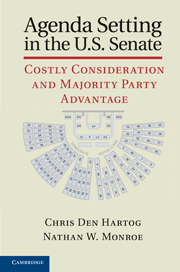Book contents
PART II - SENATE PROCEDURE AND CONSIDERATION COSTS
Published online by Cambridge University Press: 07 October 2011
Summary
Introduction to Part II
The purpose of Part II is to provide empirical support for our claims about consideration costs. To this end, we examine Senate decisions at the committee stage (Chapter 4), the scheduling stage (Chapters 5 and 6), and on the floor (Chapters 7, 8, and 9). We show that, at each stage except scheduling, majority proposals are disproportionately likely to move forward in the legislative process; that is, a majority-sponsored proposal that reaches a particular stage is more likely than a minority-sponsored proposal that reaches the same stage to move forward in the process.
We want to emphasize four points about the data analyses in this part of the book. First, the results are not meant to be taken as a series of independent tests demonstrating party effects. Second, the results are meant to establish that the majority party has a systematic (but not absolute) advantage when it comes to moving proposals to final consideration. Third, we do not argue that the majority wins at each stage on every bill that it gets to final consideration or that it needs to do so to pass its proposals. Senate agenda influence does not follow from repeated applications of the same approach, as with the House and special rules. Senate agenda influence is a more ad hoc affair. It tends to be cobbled together on the fly, in response to fluid and ever-changing circumstances.
- Type
- Chapter
- Information
- Agenda Setting in the U.S. SenateCostly Consideration and Majority Party Advantage, pp. 59 - 61Publisher: Cambridge University PressPrint publication year: 2011



